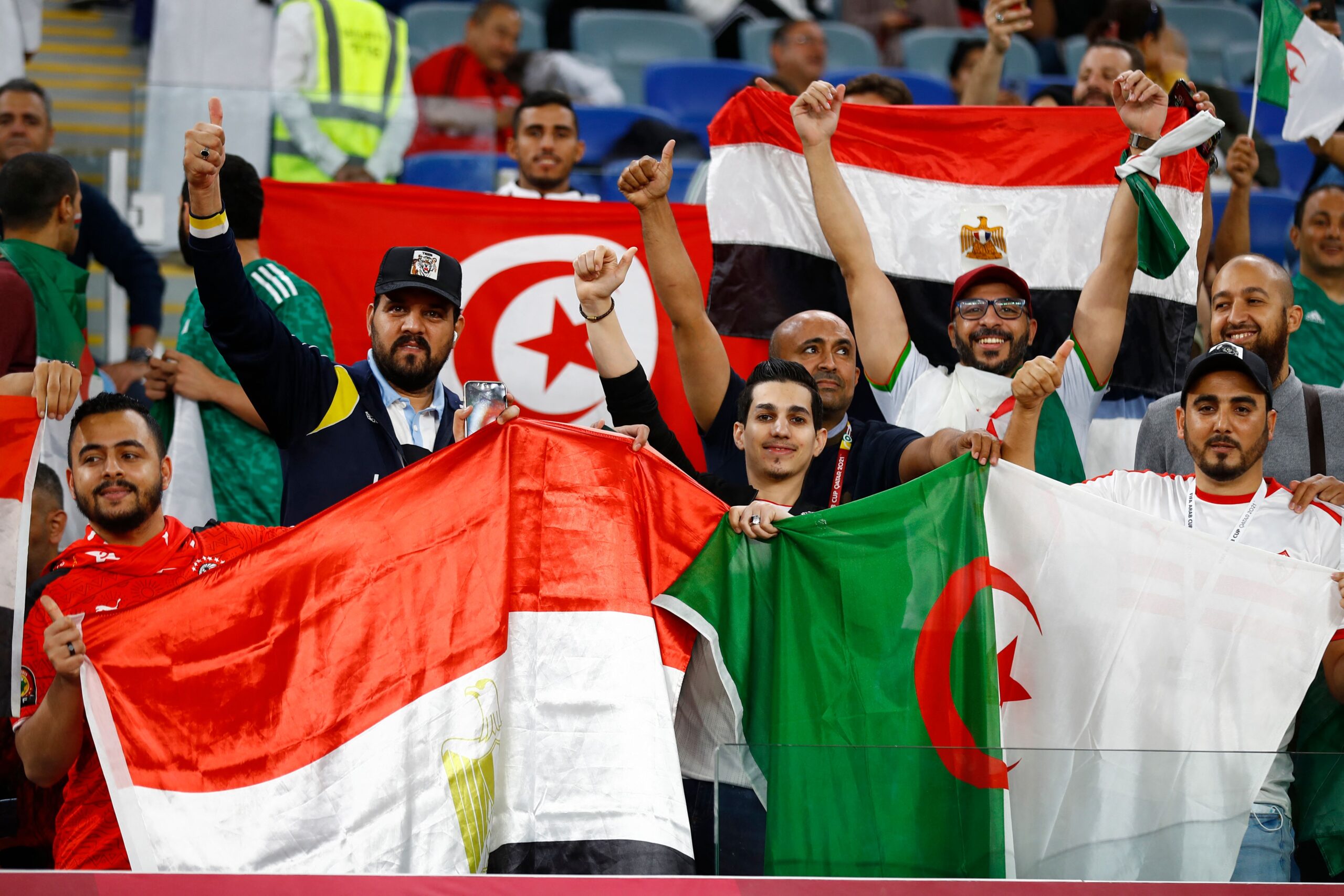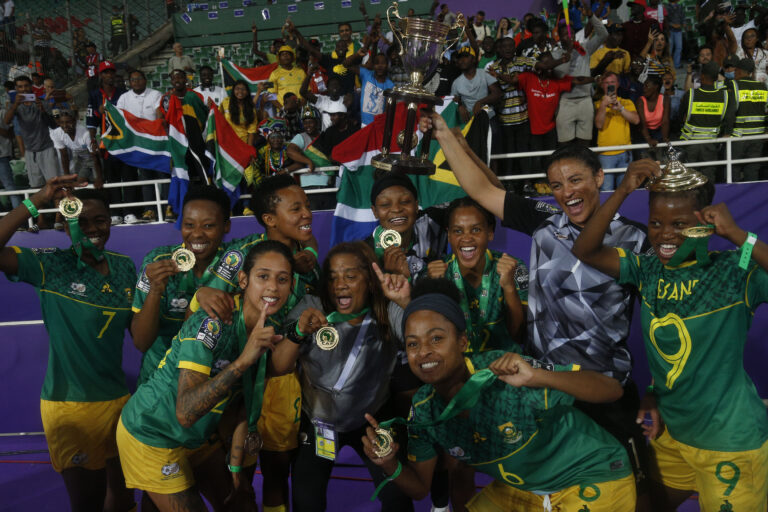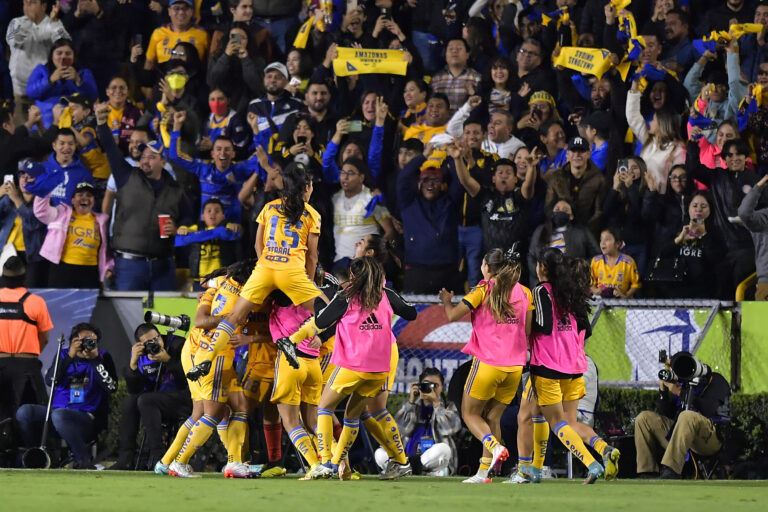Can Egypt and Algeria Follow Morocco's Lead to Become Soccer Powers in North Africa?
Why this matters
Coming off the success of Morocco men's and women's football, the blueprint for cultural and economic progress toward football success in North Africa is out. Can Algeria or Egypt follow suit?
Fans all across the world marveled at a historic Morocco team that made waves at the 2022 FIFA Men’s World Cup by becoming the first African country to reach the tournament’s semi-finals.
The achievement brought pride to many who saw themselves in the team. But their run also raised a question: If Morocco can do it, why can’t others do the same?
In North Africa, the rivalry between Morocco, Algeria, and Egypt runs deep. Those nations share history on the pitch, not to mention geographic proximity and political tensions. But while Morocco was celebrating its wins in Qatar, the Algerian and the Egyptian teams were at home and watching as one of their biggest competitors made its mark on the world stage.
Morocco’s deep run at the World Cup wasn’t just a fairytale sporting moment. It was the result of the Royal Moroccan Football Federation’s (FRMF) deliberate efforts to turn Morocco into a dominant footballing force. The FRMF implemented a plan to invest in and develop the nation’s men’s and women’s teams equally while also financing the construction of modern training facilities and stadiums and promoting its domestic leagues. The organization’s ability to sustain investment and prioritize the growth of the sport is unique for the region and has helped establish Morocco as a leading force in African football.
In 2017, Moroccan King Mohammed VI expressed his vision for the future of Moroccan sports during a debate organized by the FRMF and the Confederation of African Football (CAF). He emphasized the need to improve the quality of training, develop infrastructure, establish professional entry requirements, and strengthen the marketing mechanisms of African football.
With the government’s backing, Morocco has increased the quantity and the quality of its sports facilities, including stadiums, training facilities, and academies. The Mohammed VI Football Complex, which opened in 2019, stands out as a true gem. The complex has been widely praised as one of the most outstanding sports centers in the world, with Bayern Munich’s and Senegal’s Sadio Mane saying, “I did not think that we had training centers like this in Africa with such international standards. It is truly amazing. I have played in the biggest clubs in Europe but have not seen anything like this.”
The FMRF has reaped the rewards of this investment. Morocco were the first African country to win two consecutive African Nations Championship (CHAN) editions, triumphing in 2018 and 2020. The tournament features national teams consisting of players currently playing in their respective local leagues. In 2022, Moroccan clubs won the CAF men’s and women’s Champions Leagues. Morocco finished runners-up at the 2022 Women’s Africa Cup of Nations, defeating three-time defending champions Nigeria in the semifinals.
As in Morocco, football is the most popular sport in both Algeria and Egypt. Historically, the two have been more successful than Morocco on the pitch, but in recent years they have fallen behind, unable to develop clear visions for their football infrastructures.
The ‘Absurd’ Social Politics of Algerian Footballers
As Morocco dominated in recent years, the Algerian government has seemingly been more focused on stymieing the Moroccan football team over diplomatic relations than developing a football infrastructure for itself.
“I was one of many Algerians cheering for Morocco during the World Cup, but when I sit back and think about it, I want to be cheering for my team at the semifinals of the biggest football tournament on the planet. Not one of our rivals. But I don’t think that’ll happen anytime soon,” says Soufiane, who formerly played alongside brother Salem at NA Hussein Dey in the Algerian Ligue 2, the second highest division overall in the Algerian football league system. Both brothers asked to be referred to by their first names for privacy reasons.
Algeria has a history of success in African football, having won the Africa Cup of Nations (AFCON) twice, in 1990 and 2019. The nation also boasts a talented crop of players and, unlike many African countries, has a balanced squad that doesn’t revolve around a few star players.
However, the team’s performance at AFCON in 2022 was considered a disappointment. Algeria had entered the tournament as one of the favorites but struggled to find form in the group stage, drawing all three matches. In the knockout stage, Algeria faced Ivory Coast in the quarterfinals and was eliminated from the tournament in a 2-1 defeat. A few months later, Algeria failed to qualify for the World Cup.
Related: What Women’s Soccer Can Learn From Barcelona and Lyon’s Dueling Dominance
Algeria’s up-and-down success in football can be linked to its geopolitical history. Algeria won independence from France’s violent colonization in 1962, but the foundations of France’s rule remain in place due to the nature of the 132-year occupation. It affects the football pipeline as well.
“It’s pretty well known here that anyone who is good enough to truly make it is told to leave for France,” says Salem. “We don’t have the infrastructure to fully develop talented kids into world-class stars to compete at the highest stage.
“The Algerian Football Federation (FAF) doesn’t seem to find it embarrassing to send our best chances at footballing success to a nation that has taken advantage of us at every turn. We continue to feed them all our resources. It sounds dramatic, but eventually, we’ll run dry if we haven’t already.”
During its colonization of Algeria, the French government enticed its own citizens to relocate and settle in Algeria, in hopes that Algerians would adapt to what France deemed the superior and more civilized culture, language, habits, and mannerisms of the French people.
The French being present in Algerian daily life allowed them to take control of Algeria in all aspects, but most impactfully by westernizing the culture. Algeria, to this day, is still attempting to reconstruct its identity away from the French.
“[The effects of colonialism] are present everywhere in Algeria,” says Salem. “If you speak ‘proper’ French, you’re seen as more intelligent than if you speak Arabic, colloquial or otherwise. We model our politics off of the French, our business models, our entertainment, everything.
“And forget it if you want, in any way, to proudly display any semblance of Amazigh culture [the ethnic group indigenous to North Africa, descendants of the pre-Arab inhabitants of the region]. That’s just asking to be reprimanded by anyone who considers themselves the upper class.”
The cultural biases that favor French language and culture can also influence how Algerian football players are perceived, particularly when it comes to pursuing professional opportunities abroad.
“In football, if you go to France to play, you’re not only seen as a player who is more talented but as a player that is more hardworking and more dedicated to becoming a professional,” Salem continues. “If you stay in Algeria, the narrative becomes, ‘He was too lazy. He didn’t want to leave the comfort of home. He isn’t committed to football.’ Can you believe that? That’s what people say when someone chooses to be developed as a player in their own country. It’s absurd.”
These attitudes reflect a complex and nuanced culture around football in the country, where players are judged not only on their skills but also on their ability to navigate the complex web of social and cultural expectations that surrounds the sport.
Players of Algerian descent have long played for the French national team, including none other than Zinedine Zidane, who is widely considered France’s best ever player.
Footballers who have the option to pick a country to represent internationally through their parents are often questioned and harassed by fans, regardless of which way they go. But Zidane is one of many football players who, coming from the Algerian diaspora, have had to grapple with the challenging expectations of proving their loyalty to their birth country while also combating the stigma attached to Algerians living in France.
“There is a notion that those with ties to both France and Algeria have a ‘duty’ to pick Algeria. That isn’t what I am advocating for,” says Soufiane. “If a French Algerian wants to play for France, I don’t blame them.”
Instead, Soufiane blames leadership.
“It’s just pure laziness on [the FAF’s] part,” he says. “They don’t want to put in the work to make us a dominant footballing nation, so they just say, ‘Go to France. They have everything ready there for you.’
“It’s almost like the FAF deliberately makes it less attractive for young prospects to stay in Algeria, develop in Algeria, and eventually enter the Algerian football setup.”
Salem is frustrated by the way Algerian athletes treat their home country when they get to France.
“They’ll claim us, champion us, but not actually play for us or want to represent us when it matters,” Salem says. “And on the flip side, so many of Algeria’s national team were born and trained in France. As much as no one wants to admit it, if they were good enough at the time, a lot of them would have chosen to represent France on the world stage.
“That’s just the reality. It’s just this constant, never-ending cycle. We’re forever shackled to our traumatic history.”
Regardless of the changes brought by decolonization, the legacy of France’s time in Algeria has bled into modern-day society, and more than six decades later, France’s former colonization of the country is still a barrier to Algeria succeeding as a football nation.
Religious Expression vs. ‘Conservative Ideologies’ in Egypt
On the other side of North Africa lies Egypt, a country that has also struggled with finding a space in the modern world as a result of imperialism. In the world of football, Egypt found huge success in Africa in the early and mid-2000s. The national team was composed of a golden generation that won three straight AFCON titles from 2006 to 2010, an unprecedented achievement. The Egyptian Premier League was also thriving, with players from the national team opting to play in Egypt rather than abroad. Attendance numbers were the highest on the continent.
“Egypt were doing well in Africa during the 2000s,” says a former board member of the Egyptian Football Association (EFA), who spoke on the condition of anonymity due to the sensitivity of the subject and their own security. “Failing to make the World Cup during that time was definitely a disappointment, but making our mark in Africa was really important.”
The board member singles out one group in particular for creating the tensions that have led to the national team’s fall from the top.
“The EFA will always have this stain on their image due to their mishandling of Coptic footballers wanting to make a name for themselves in Egypt,” says the board member.
Copts, an indigenous ethno religious group in Egypt, compose at least 15% of the country’s population. The majority of ethnic Copts follow the Coptic Orthodox Church, giving Egypt the largest Christian population of any nation in the SWANA region (Southwestern Asia and North Africa).
A lack of religious freedom in Egypt means that Coptic Christians, the largest religious minority in the country, are negatively affected in all walks of life. “Football is no exception to the rule,” says the former EFA board member.
The former board member points to countless stories of players who are prevented from joining the youth football system because their names give away their Coptic heritage.
“It is extremely difficult to prove discrimination and exclusion on the basis of religion, especially in a society that just upholds the prejudice Copts face,” the former board member adds. “Say a player wants to report what they think was religious discrimination from a club. Who do they go to? The EFA? They won’t get much help from the organization that perpetuates the discrimination. There is no solution.”
In the past three decades, only 12 Christian players have made it to the Egyptian Premier League, an incredibly small number for a significant portion of the country’s inhabitants. Even fewer have been called up to the national team. The EFA has overseen little progress in undoing these trends, despite its seeming need for top talent.
“It’s not like the national team is in a place to be selective of who they pick to play for Egypt,” the former board members says. “Not sure if they’ve missed it, but we haven’t been performing well for over a decade.”
After the Egyptian Revolution, football struggled to regain its footing in the country following the successful 2000s, with several sporting and political uprisings impeding the sport’s success in the country. The 2011-12 and the 2012-13 seasons were canceled by the Egyptian government in the early 2010s due to the Port Said Stadium Riot, in which more than 70 people were killed, and the subsequent Egyptian coup d’état. The best players opted to play in European clubs amid the political unrest, which may have had a negative effect on the quality of the national team for years to come.
Since 2010, Egypt has made AFCON finals in 2017 and 2021 and also qualified for the World Cup for the first time in 28 years. All of those achievements are signs of success but marred by controversy and amounting to “paper over the cracks,” according to the former EFA board member.
“When we qualified for the World Cup in 2018, it wasn’t about providing the team with all the resources necessary to be as successful as possible in Russia,” the former board member says. “For the EFA, it was about promoting themselves as an organization.”
The EFA has historically used its position to cozy up to tyrants and authoritarians. For example, Egypt’s star player, Mohamed Salah, was used as a political pawn by the EFA to strengthen the ties between Egypt and Chechnya to the point where the player reportedly contemplated a premature retirement in light of the EFA’s actions. (Since Ramzan Kadyrov became head of the Chechen Republic in 2007, many famous figures, including athletes, have reportedly been personally invited to bolster the region’s image.)
Moreover, the EFA has faced allegations of seeking complete authority over the national team, including spreading false information about managers to absolve themselves of responsibility in national team affairs. Former Egyptian manager Carlos Queiroz claimed that the EFA’s board of directors attempted to spin his dismissal into a resignation. Queiroz also reportedly said that the EFA wanted to dismiss his backroom staff to force him into resignation and that he was penalized $25,000 USD from his dues for events out of his control.
While these misaligned priorities plague the men’s national team, the women’s national team is largely neglected by its overseers. The idea that it might step up its standing in world football is a “pipe dream,” according to the former board member.
In 2018, Egypt was excluded from FIFA’s women’s national teams rankings because Egypt did not play enough qualifying friendly matches against other nations. It took three years for the team to return to the rankings after playing four friendlies from 2016 to 2022. In that six-year span, Morocco played 17 friendlies.
“The EFA has mishandled the women’s team completely,” the former board member says. “I do believe there is a market for women’s football in Egypt. Go to any nadi [country club] in any major city in Egypt, and you’ll see girls and women of all ages playing football. At a high level. You’ll see it in the streets, too.
“We, as a nation, have found success when it comes to women’s squash and women’s tennis. Handball, recently as well, with the youth team. And fans turn up for those sports. It’s naive to think that, with a little work, it wouldn’t be the same for football.”
Discussion about developing the women’s team “lasted less than 15 minutes,” the former board members says. “Once or twice, you start to think that it may be a coincidence. A hundred times? You start to expect disappointment.”
The EFA did start a national women’s football league, which began with the 2016-17 season. Additionally, the EFA has initiated several grassroots programs and campaigns to encourage more girls to take up football. However, despite these efforts, women’s football in Egypt still faces significant challenges, including limited funding, social and cultural barriers, and a lack of infrastructure and facilities.
While Algeria and Egypt may believe they are among Africa’s greatest footballing nations, history can prop up status for only so long, especially in the ever-changing world of football. If the trend continues, those nations risk being left in the dust while Morocco builds a more inclusive, sustainable, and successful footballing culture.
Morocco’s journey toward becoming a dominant footballing force reflects its ongoing struggle to find its place in the world as a post-colonial nation. But unlike its counterparts, there is optimism that the FRMF has not let the region’s social and political tensions hold back its efforts to build a solid and stable footballing infrastructure.




